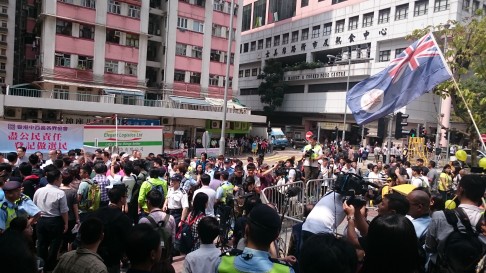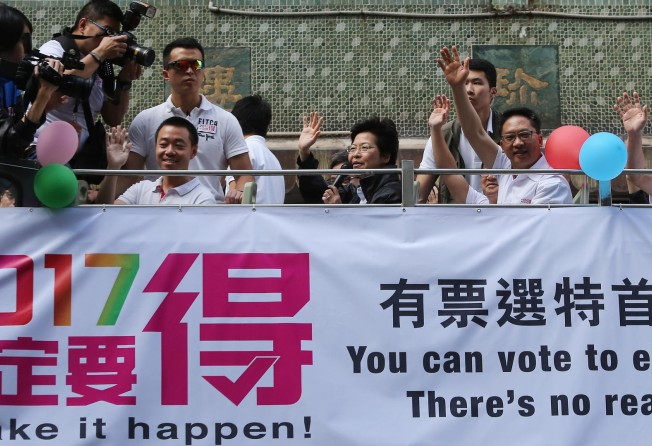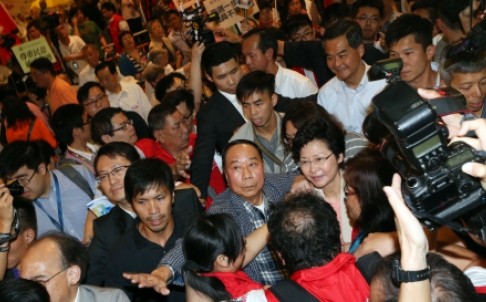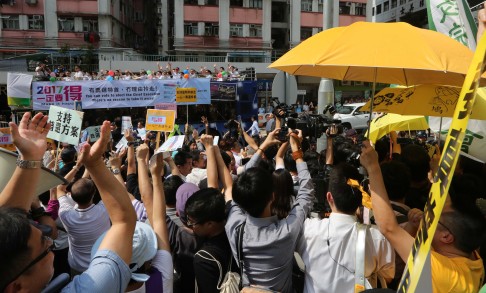
Protests hit Carrie Lam's neighbourhood 'bus parade' to promote Hong Kong electoral reform
Wheels come off open-top parade as protesters shout down officials and clash with police

An open-top bus parade by officials seeking to drum up support for the government's political reform package ended in arrests and chaos yesterday as opponents made themselves heard along the route.
The bus trip marked the start of a massive publicity campaign intended to get the public behind the contentious plans for the 2017 chief executive poll before lawmakers vote on it. But their efforts received a blow earlier when the European Union said it supported Hongkongers in their wish to have a "genuine choice" of candidates in 2017.
Thirty officials boarded the bus, including Chief Secretary Carrie Lam Cheng Yuet-ngor, Financial Secretary John Tsang Chun-wah and Secretary for Justice Rimsky Yuen Kwok-keung. They teamed up to peddle the blueprint for reform officially announced on Wednesday, which they hope will form the basis for the city electing its leader by universal suffrage for the first time. Based on a framework set by Beijing, the package limits the number of candidates to two or three, who will need majority support from a 1,200 strong nominating committee.
Pan-democrats say that amounts to political screening and fake democracy, and have vowed to deny the plan a two-thirds majority in the Legislative Council in June.
The bus made its first stop at Kennedy Town in the afternoon - but sped off seconds after arrival amid clashes between pro- and anti-government protesters and police. Three protesters were arrested on suspicion of wounding police officers and interrupting them in the course of their duties.
WATCH: Officials hit the road in Tai Po to promote electoral reform package
Video by Emily Tsang
The officials never stepped off the bus as they continued to Kowloon and New Territories.
Chief Executive Leung Chun-ying was absent from the tour as he joined an Asean summit in Kuala Lumpur.
Lam, whose voice was largely drowned out during the tour, said afterwards her team would continue to reach out to the public to explain the reform plans.
But the failure of the officials to engage did not impress some.
"I clearly saw them coming in and leaving like rats in three seconds," said Jack Chan Hon-ting, 30, of Kennedy Town. "I couldn't even see their faces clearly."
In a joking reference to Leung's comment on Wednesday that community outreach was an "easy job", Chan said "he is right in this sense".
The Federation of Students, Scholarism and radical groups such as the League of Social Democrats and People Power were among the protesters.
The larger pan-democratic parties, the Democrats and the Civic Party, were not present. They will launch their own campaign to win over the public today in Wan Chai.
Before the street campaigns kicked off, the European Union joined the debate in its latest report on Hong Kong affairs. The 27-strong bloc said it felt an "attachment" to the notion of universal suffrage in the city.
"As a stakeholder in Hong Kong's future, the EU supports the wish of the Hong Kong people to have a high degree of political participation and a genuine choice in the chief executive election of 2017 and thereafter," it said.
The choice of words echoed the demands of pan-democrats.
In response, a Hong Kong government spokesman said the reform blueprint was lawful, rational and reasonable.
Meanwhile, key figures in the Beijing-loyalist camp continued to speak up for reform yesterday.
Elsie Leung Oi-sie, vice-chairwoman of the national legislature's Basic Law Committee, slammed pan-democrats for failing to use past opportunities to talk with Beijing. "The door of communication has always been open. There's no need for any middleman," she said.
Fellow committee member Professor Rao Geping saw no possibility of Beijing changing its framework, but said there could be room for local legislation in the next five to 10 years to amend the make-up of the nominating body. The body's members - besides the 35 directly elected lawmakers - are chosen by 250,000 corporate and individual voters.
Elsie Leung, Rao and a third Basic Law Committee member, Maria Tam Wai-chu, said they had heard nothing of a rumour that Beijing planned to codify how it appointed the city's leader. The rumoured law would include setting criteria Beijing could use to reject a chief executive-elect.

